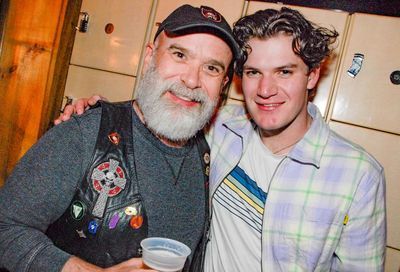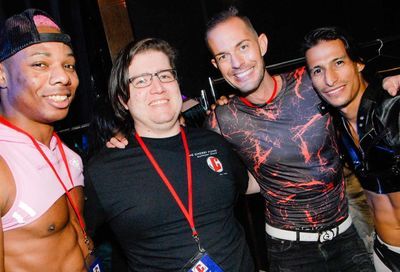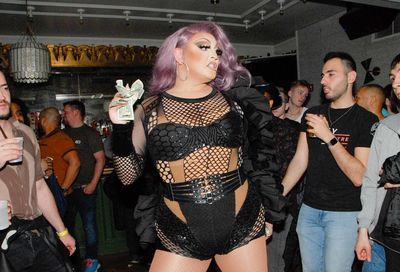Victory In Leather
Jason Hendrix is Washington, DC's first ever International Mr. Leather
“Utter shock.”
That’s how Jason Hendrix describes his feelings the moment his name was called as this year’s International Mr. Leather.
“My hands were shaking. I was crying a little. I was like, ‘What do I do? Where do I go?’ They tell you backstage if your name is announced what you’re supposed to do. And I couldn’t remember any of it.”
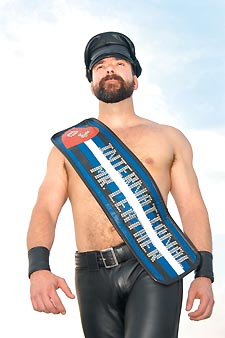 |
It all came back to him quickly enough. And at the end of a long, competition-driven Memorial Day Weekend in Chicago, Jason Hendrix was awarded the title IML 2004, along with the medallion and massive, he-man sized sash that goes along with it.
The 41-year-old Hendrix, who won Mr. D.C. Eagle in November (qualifying him for IML), is the first Washingtonian to bring home the title. It’s a tough competition, as 57 leather men from around the globe vie for the honor to represent the community in all its leather-bound glory. As Jason’s boss, Julie Scofield, executive director of the National Alliance of State and Territorial AIDS Directors (NASTAD), exclaimed upon his return, “You’re a gay leader now! For the next twelve months you get to go out and talk about issues in your community.”
It wasn’t always about leather for Hendrix — well, not openly, anyway. He spent a good portion of his fifteen years in Washington living The Khaki Life. “I was an Abercrombie zombie,” he laughs. But exploration into what some of his non-leather friends jokingly refer to as “the dark side,” and guidance from an S&M mentor, helped Hendrix fully realize the experiences he wanted most out of life. He’s now a mainstay of what he terms “a very vibrant D.C. Leather scene.”
As for IML, Hendrix likens the contest process to a job interview.
“They’re looking for the person who can best handle the job,” he says. “Do they have a message? Can they speak well and succinctly? How do they look in their leather? How do they communicate with themselves? What’s their body language like? Can they handle the schedule? Can they handle the pressure? What’s their personal life like? What’s their professional life like? All of these things go into figuring out who is going to make it.”
The win hasn’t gone to Hendrix’s head — he’s incredibly down to earth about his triumph. Perhaps it’s due to the strong sense of values instilled in Hendrix by his mother, who, upon learning of her son’s victory, sent him an e-mail with the words, “You’ve always been a winner in my book.”
METRO WEEKLY: Let’s start by talking about how you came to live in Washington.
JASON HENDRIX: I grew up in a little place called Colonial Heights, Virginia. Went to college in Richmond at Virginia Commonwealth University. Two years after college I decided to get out of Richmond — all of my fraternity brothers were there, all my family was there. I needed to get away. Part of that was from a desire to want to come out, because I wasn’t out yet. I moved up here in 1989 and after being here for about a year, I came out.
MW: How did it feel at the time?
JASON: It felt great. It was like a weight had been lifted off of me.
MW: How did it go with the folks?
JASON: My mother said, “Well, you know, it’d be a really boring world if we were all the same. I still love you, you’re still my son, nothing’s changed.” But she was worried because of how she perceived gay people were treated — she didn’t want me to be treated negatively by other people. My father, when I told him — my folks were divorced at this point — patted me on the knee and said, “Well, son, sometimes you just have to come out of the closet.” I still don’t understand what that means. [Laughs.]
MW: How did you wind up at NASTAD?
JASON: I was working as Assistant Director of Financial Aid at American University when the ’93 March on Washington happened. I was moved by this gathering of people and this energy they had — they were so committed to fighting for gay rights. It was the most incredible thing. I was like, “I’ve gotta give back to the community. I’ve gotta do something.” My boyfriend at the time said “If this is what you want to do, go ahead, quit your job at A.U. and find something you want to do.”
So I went to go work at AIDS Action as an unpaid intern. While there, NASTAD was forming. I met its Executive Director [Julie Scofield] and interviewed for a position. I got a call back and she said, “We really enjoyed your interview, we thought you were great, but we’ve offered the job to somebody else.” I thought, “I’ve never gotten a rejection phone call for a job before.” I’d gotten rejection letters, but never a phone call. And then she said, “But we were really impressed with your background and we’d like to offer you another position — we don’t know what we’re going to call it, or what exactly your duties are going to be, but we’re going to pay you this much and you can start on this date. And I can only guarantee employment for six months.” And I was like, “I’ll take it.” Over ten years later, I’m still there.
At the time I got there, there were four of us. We now have thirty employees. It started out from this small organization where we all did a little bit of everything to becoming a very sustainable, important organization. It’s been great helping it get to where it is today.
MW: Increasingly we hear complaints from activists of a certain complacency growing around the AIDS crisis. What’s your take on it?
JASON: There was period after the cocktail came out and people weren’t dying. We weren’t seeing people walk down the street with canes, hunched over. We weren’t seeing people emaciated because of what the disease had done to them. So I think a lot of people — especially a lot of younger people — got a false sense of “Oh, you don’t die with this.” Even back in May I met a guy in his early forties who had just gotten infected. And I wanted to say to him, “This information’s been out for twenty years. How?” It amazes me.
It also amazes me to read how much barebacking there is going on. Especially among men who are positive. But there are different strains of the virus and their strain may not be great with the medicines you’re taking. You could be screwing yourself over, literally and figuratively.
But everybody can decide what they want to do. It really is up to the individual. I can’t tell somebody “You have to do this, you have to do that.” If I’m going to have sex with them, yeah, we have to wear condoms. But I can’t go out really and force people to do something.
MW: Invariably every person I’ve spoken with who knows you says, “And he used to be such a preppy.” They remember you as one thing and seem surprised at finding out you’re now not only a Mr. DC Eagle but an International Mr. Leather. Talk about your transition into the world of leather.
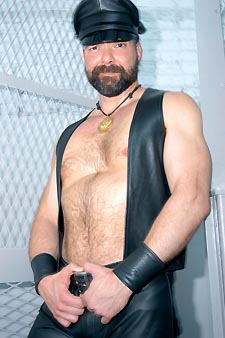 |
JASON: I can remember being in JR.’s one day for happy hour — I always went to JR.’s because that’s where my friends went. And I remember seeing three guys come in who were obviously leather men. My friends were like “What are those leather queens doing in there? Don’t they know they’re in the wrong bar?” And I just remember looking at these three men and thinking, “They’re uber-men. I like that. I like that a lot.”
Sometime later, I went with my first boyfriend to Provincetown. There was a guy staying at the guesthouse we were at. I always would kind of gravitate towards these men who I assumed were into leather or S&M or whatever. So I ended up going back with this guy to his room — and having my first S&M-B&D sexual experience. I loved it. He was smoking a cigar. He tied my hands to the headboard. I don’t remember all that happened, but I remember there was pain and it was very sensual. It was on a level that I had never been to before. It was not just sex how I knew sex. It was mind-blowing to me. And I was just like, “Wow, incredible.”
When I got back to D.C., I shyly went to the leather rack. Shyly. Kind of like, “Is anyone seeing me go in the door?” I bought some leg cuffs and some handcuffs, brought them home, gave them to my boyfriend, and he was like, “What do you want to use these for?”
After that relationship ended, I was at the gym one day talking to this guy. And for some reason — I can’t tell you why exactly — I said to him, “I’m interested in S&M.” And he said, “I know somebody you should talk to.” He set me up with a gentleman — all I had was a first name and a phone number. We set up a meeting. The guy was like “Here’s the address. Be here at this time. Don’t be late. Wear jeans, boots, tee-shirt.” So I go over, I have no idea who this guy is. All I have is a recommendation from someone who wasn’t really a friend, just an acquaintance — but something told me it was okay.
I went to this man’s house and he just started mentoring me about S&M. The whole role-playing part — being the submissive and learning from the dominant. And I ended up for the next couple of years being mentored by this man and learning [S&M] things from him. At the same time, there was someone else I’d met who was mentoring me in bondage and discipline — rope, knots, flogging and things of that nature.
MW: But you kept your involvement in the scene quiet.
JASON: People would say to me, “I hear rumors that you’re into really heavy duty stuff.” And I was like “No, not really.” Because I didn’t want them to run away. I wanted to have a date, somebody to go to the movie with. I didn’t want to scare them away. Although I think that might have been why some guys wanted to go out with me.
I was worried about what people would think. You want to fit in, you want to be part of the group, you want to be liked by everybody. A lot of gay men are like that. Let’s face it, most of us were not part of groups growing up. We didn’t fit in. And I think so many gay men, when they first come out, want to fit in. They want to be liked. And there are those few strong enough to be who they want to be. And they stand out. And I would see those guys and was envious of them. I wanted to be more like that and be who I wanted to be, not who I thought people wanted me to be.
MW: It sounds like you were leading a double life to some extent.
JASON: [Laughs.] To some people. Of the fifteen years I’ve
lived here, the last third had been more where I’ve let it come out. Left the facial hair all the time. The short haircut. Took on the leather persona. I don’t have to worry about things like “Is what I’m wearing going to be okay?” Is the way I look going to be okay?”
MW: At some point, to get where you are now, you had to say to yourself “I’m reconciling both of my sides.” Was there anything in particular that prompted this?
JASON: I just got to a point in my life, as I was getting into my thirties, where I was going to more leather events and going to the Eagle. I was like, “If these guys can do it, I can do it. I can be who I am. And I can be out about who I am.” It’s really about accepting who you are. And what’s so great about it is that I can be in a coat and tie going to work or at a function and I’m a leatherman. And other leathermen will see me and know it. Because it’s part of me.
MW: Have you buried the preppy side forever?
JASON: No, I think it’s always going to be a part of me. I still wear khakis to work. But I have changed. I’ve evolved. I’ve been fortunate enough to accept who I am and what I like, and not be ashamed of it. I like my kink. It’s part of who I am.
I like to use the word evolve because I think all people go along a path. And as we go along that path we try new things. Some people will decide to go off on this road, they find where they like to be and they’re going to stay there and that’s fine.
MW: Most people say you’re a really nice guy. I’ve done my research on you here — that’s the impression you leave.
JASON: [Laughs.] You know, somebody came up to me Sunday morning of the IML contest and said, “When I saw you come out Saturday evening at the Pecs and Personality [portion of the competition]” — that’s when you have to come out in your jockstrap and show off your physique — “I could tell you were a pig and you were a player. And I was like, ‘That’s the kind of guy we need to have as IML again.’ I really hope you win.” And I said thanks, and as I walked away, he leaned over to his boyfriend and said, “He’ll never win. He’s too nice. They won’t pick him.” The interesting thing is that after I won, so many of the guys I competed with were like, “I’m so happy you’ve won because you’re such a nice guy.” And I’ve gotten emails from people saying, “It’s nice to see a nice person win.”
 |
MW: Geez, who normally wins? Some evil, horrible person?
JASON: [Laughs.] No. But it’s very easy for somebody to let this go to their head. In the real world, what does this mean? You have to look at it that way. My friends joke with me, “Oh, you’re a big celebrity now.” I’m not a big celebrity. I’m a celebrity to a small portion of the population. And I’ll do what I can do during my year to fulfill this opportunity that’s been given to me. This is the big granddaddy of all the leather titles. And I can’t say that I didn’t want it, I did. I did want it. But I didn’t think I’d get it.
MW: Why not? You’re a good-looking guy.
JASON: A lot of people kept telling me, “You’d make a great titleholder because of your looks.” And I thought, but it’s not about looks. Looks are definitely part of it, but that’s not what it’s all about. It’s about what you have done in the community, what you have done in the leather community. What are your goals, your desires, your dreams? A lot of people are like, “I look so much better than that person, I could be a titleholder.” But no, you couldn’t. Have you done stuff in the gay and lesbian community? Have you done stuff in the leather community? Are you active in the community?
MW: So it’s not a beauty contest.
JASON: No. What are your views? What are your opinions? How do you conduct yourself on stage? How are you in public speaking? Are you comfortable in your own skin? It’s not about who has the best body. It’s about who’s comfortable in their body.
MW: The IML title is, as you noted, the big one. What does it mean to you?
JASON: I’m one of only twenty-six men in the world who have this title. I’ve always looked at the man who’s been IML and been like, “Wow.” And when one of them even talked to me, I was like “Wow, IML just talked to me.” Because I’ve held it in such high regard. And to be that person now really means a lot to me. It’s an incredible opportunity that’s been given to me. And I just want to make the best of it and get my messages out during my travels [to other events over the year].
MW: What are your messages?
JASON: I have a few. Leather [S&M] mentorship is one of my big messages. So far that’s been the message I’ve spoken about. With the internet, you can find out so much information, but in order to really learn about S&M, you really, really have to have a mentor. You have to have somebody there to teach you. You can’t pick up a flogger and flog somebody. You just can’t. You have to be taught how to do it. You need to be taught how to tie knots. You need to be taught how to handle a whip. You need to be taught all these things. There’s no other way to do it yourself, because you’ll end up hurting somebody. Whatever kind of kink or fetish you’re into, there’s somebody else that’s out there that knows how to do it and you need to find those resources to find out. But sometimes I think people get on the internet and figure they can learn things from there, or from a book. You can learn some things, but hands on is the best.
The other message that’s really important to me is for people to register to vote. This year, more than any year in the past, we’ve got to get out and vote. The way things are right now — a constitutional amendment? I mean, you’ve got to wonder, where does it end with this administration? It’s incredible. As gays and lesbians, we need to get the message out there to everybody — vote, vote, vote. Guys, gals, get out there.
MW: You’re clearly passionate about it.
JASON: You know, it’s fun to be in the pride parades — that stuff’s great. But when it comes down to it, it’s those one-on-one conversations with people that mean something to me. That’s to me is really what being IML is about. That’s the opportunity you’re given.
And if there’s somebody out there reading this who wants to explore what it’s like in leather, I hope that they’re not afraid of it. I hope they explore it. If it’s for them, fine. And if it’s not, that’s fine, too. But if there’s something inside you — whether it’s leather or drag or whatever, try it. Don’t be afraid of it and don’t be worried about what your friends are going to think.
For more information about IML, visit www.imrl.com.
Support Metro Weekly’s Journalism
These are challenging times for news organizations. And yet it’s crucial we stay active and provide vital resources and information to both our local readers and the world. So won’t you please take a moment and consider supporting Metro Weekly with a membership? For as little as $5 a month, you can help ensure Metro Weekly magazine and MetroWeekly.com remain free, viable resources as we provide the best, most diverse, culturally-resonant LGBTQ coverage in both the D.C. region and around the world. Memberships come with exclusive perks and discounts, your own personal digital delivery of each week’s magazine (and an archive), access to our Member's Lounge when it launches this fall, and exclusive members-only items like Metro Weekly Membership Mugs and Tote Bags! Check out all our membership levels here and please join us today!

















